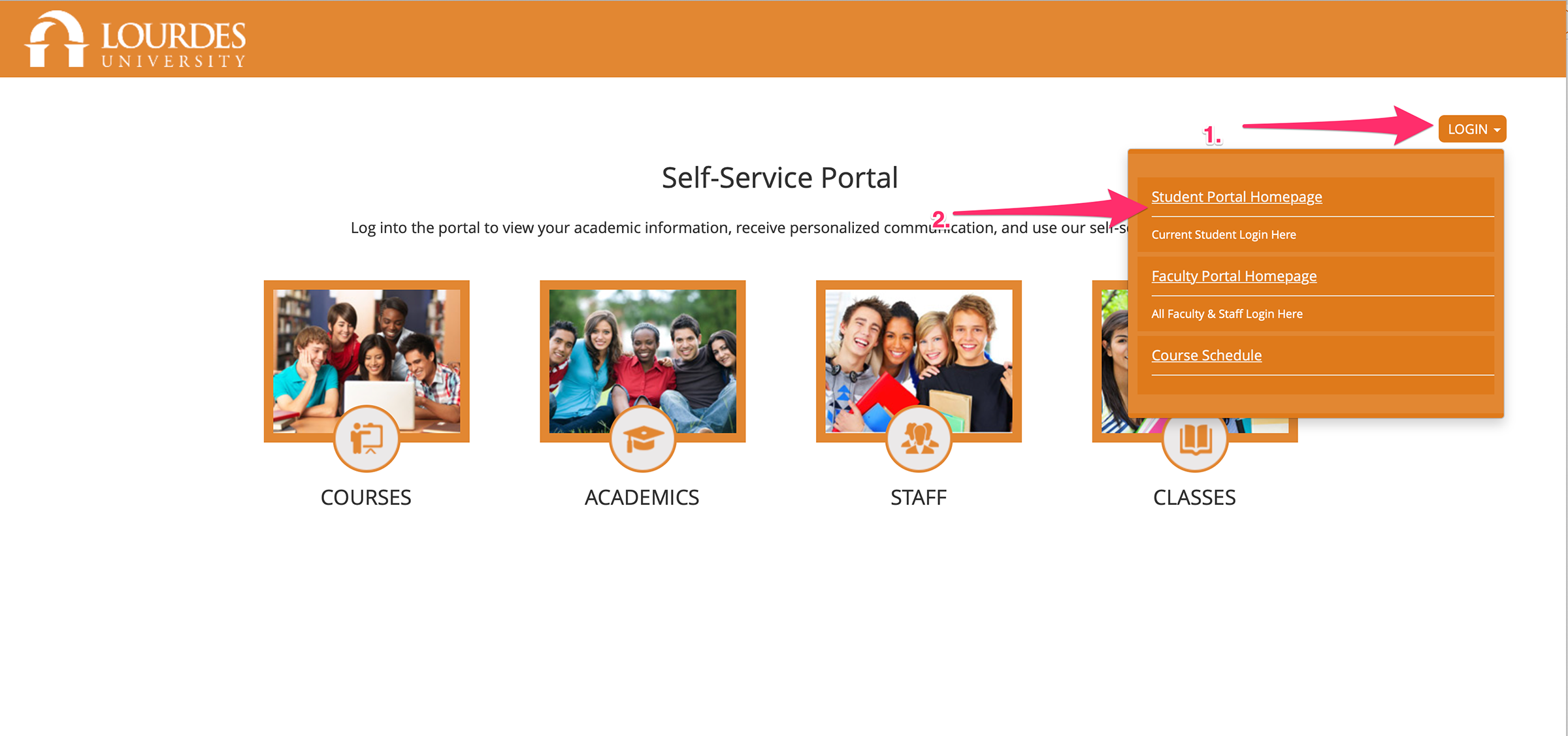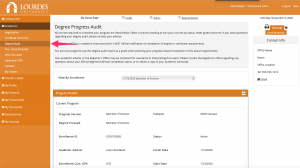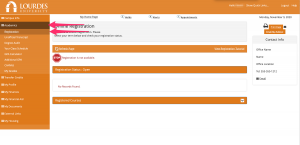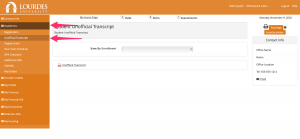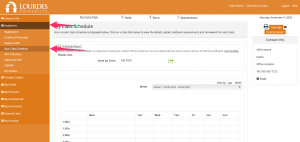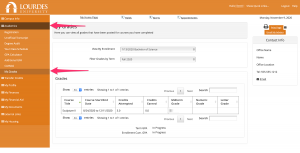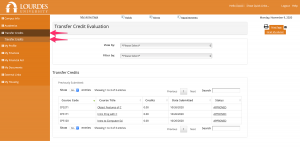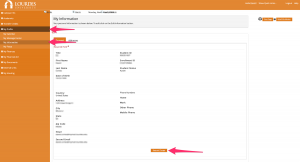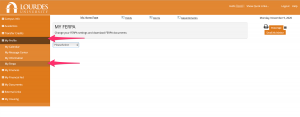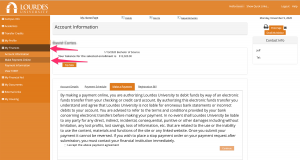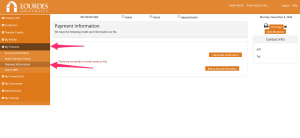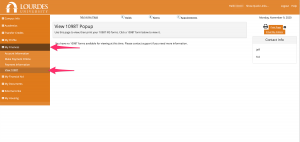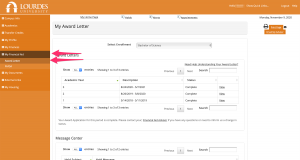WHAT IS OFFICE 365?
This service provides all students, faculty, and staff of the University access to email, Word, Excel, PowerPoint, OneDrive, and several others products and services. These can be accessed online and on your computer through Microsoft Outlook. As a member of the Lourdes University community, your Office 365 subscription gets you access to up to five installations of Microsoft Office on personally-owned devices that are valid during the duration of your employment and/or student life at Lourdes University!
As part of the Office 365 offering, every faculty/staff member and student currently enrolled at Lourdes University is given an email account for use throughout the duration of their time at Lourdes. Faculty and staff email addresses are formatted as first initial + last name @lourdes.edu (i.e. jdoe@lourdes.edu). Student email addresses are formatted as first name.last name@mymail.lourdes.edu (i.e. john.doe@mymail.lourdes.edu).
USE OF THE OFFICE 365 ACCOUNT
Faculty, staff, and students are required to use their Lourdes University email accounts for official email communication with other members of the University. If a student uses another email account to submit an assignment, the student does so at her or his own risk. Should the document fail to arrive for whatever reason, the student is accountable for a missing assignment, subject to the terms of the individual instructor’s syllabus. Under no circumstances should faculty or staff transmit or receive FERPA-protected via any email account other than their Lourdes email account.
Student email accounts will be kept for two years after the student takes his/her last course. If a student returns to Lourdes after stopping out for two years, their email account will be recreated at that time. All users can access email via logging into the Lourdes Portal.
Every faculty/staff member and student currently enrolled at Lourdes University is given an email account for his/her use for the duration of their time at Lourdes. Faculty and staff email addresses are formatted as first initial + last name @lourdes.edu (i.e. jdoe@lourdes.edu). Student email addresses are formatted as first name.last name@mymail.lourdes.edu (i.e. john.doe@mymail.lourdes.edu).
Faculty, staff, and students are required to use their Lourdes University email accounts for official email communication with the University. If a student uses another email account to submit an assignment, the student does so at her or his own risk. Should the document fail to arrive for whatever reason, the student is accountable for a missing assignment, subject to the terms of the individual instructor’s syllabus. Under no circumstances should faculty or staff transmit or receive FERPA-protected via any email account other than their Lourdes email account.
Student email accounts will be kept for two years after the student takes his/her last course. If a student returns to Lourdes after stopping out for two years, their email account will be recreated at that time. Students access email via logging into the Lourdes Portal.
Lourdes students now use an email system called Office 365.
STUDENT EMAIL FREQUENTLY ASKED QUESTIONS
WHERE DO I GO TO ACCESS MY STUDENT EMAIL?
Log into the Portal, then select Email (or simply visit http://mail.office365.com)
WHAT IS MY LOGIN (USERNAME)?
Your login is your full first name and full last name with a period between them. Example: Jane Doe would have a username of jane.doe NOTE: There is a maximum of 18 characters in the username and the period between your first and last name counts as a character. (Ex., If your name is Jane Williamson-Smith, your username would be: jane.williamson-s).
WHAT IS MY PASSWORD?
Students will receive 2 welcome emails to their personal email address that we have on file. The first email contains their new Lourdes email address, as well as some helpful links. The second email contains the temporary password for the Lourdes email previously mentioned. To make finding these emails easier, try searching in your email for the following subject lines; “Lourdes University Account Username” and “Lourdes University Account Password”. These emails will both come from helpdesk@lourdes.edu.
WHAT IS MY EMAIL ADDRESS?
Your email address is your firstname.lastname with @mymail.lourdes.edu added to it. Example: Jane Doe’s email address would be jane.doe@mymail.lourdes.edu; Jane Williamson-Smith’s email address would be jane.williamson-s@mymail.lourdes.edu.
HOW LONG IS MY STUDENT EMAIL ADDRESS VALID?
Your student email account (portal login and access to Office 365) is valid until 24 months after your last registration date. You will receive a notification one month prior to your account being closed.
SPECIAL INSTRUCTIONS FOR STUDENT EMAIL
WHERE DO I GO TO ACCESS MY STUDENT EMAIL?
Log into the Portal, then select Email (or simply visit http://mail.office365.com)
WHAT IS MY LOGIN (USERNAME)?
Your login is your full first name and full last name with a period between them. Example: Jane Doe would have a username of jane.doe NOTE: There is a maximum of 18 characters in the username and the period between your first and last name counts as a character. (Ex., If your name is Jane Williamson-Smith, your username would be: jane.williamson-s).
WHAT IS MY PASSWORD?
Students will receive 2 welcome emails to their personal email address that we have on file. The first email contains their new Lourdes email address, as well as some helpful links. The second email contains the temporary password for the Lourdes email previously mentioned. To make finding these emails easier, try searching in your email for the following subject lines; “Lourdes University Account Username” and “Lourdes University Account Password”. These emails will both come from helpdesk@lourdes.edu.
WHAT IS MY EMAIL ADDRESS?
Your email address is your firstname.lastname with @mymail.lourdes.edu added to it. Example: Jane Doe’s email address would be jane.doe@mymail.lourdes.edu; Jane Williamson-Smith’s email address would be jane.williamson-s@mymail.lourdes.edu.
HOW LONG IS MY STUDENT EMAIL ADDRESS VALID?
Your student email account (portal login and access to Office 365) is valid until 24 months after your last registration date. You will receive a notification one month prior to your account being closed.
MICROSOFT OFFICE FOR HOME (OFFICE 365)
Download instructions.

